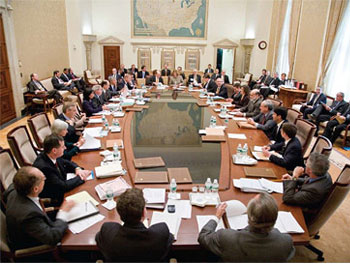 The Federal Reserve Board and the FOMC on Wednesday released the ‘minutes’ of the Committee meeting held on April 27-28, 2010.
The Federal Reserve Board and the FOMC on Wednesday released the ‘minutes’ of the Committee meeting held on April 27-28, 2010.
The following are some excerpt covering the discussions held at the meeting.
On Greece:
[P]articipants saw the escalation of fiscal strains in Greece and spreading concerns about other peripheral European countries as weighing on financial conditions and confidence in the euro area. If other European countries responded by intensifying their fiscal consolidation efforts, the result would likely be slower growth in Europe and potentially a weaker global economic recovery. Some participants expressed concern that a crisis in Greece or in some other peripheral European countries could have an adverse effect on U.S. financial markets, which could also slow the recovery in this country.
On Housing:
[T]he recovery in the housing market appeared to have stalled in recent months despite various forms of government support. Although residential real estate values seemed to be stabilizing and in some areas had reportedly moved higher, housing sales and starts had leveled off in recent months at depressed levels. Some participants saw the possibility of elevated foreclosures adding to the already very large inventory of vacant homes as posing a downside risk to home prices, thereby limiting the extent of the pickup in residential investment for a while.
On Asset Sales:
“Most participants expressed a preference for strategies that would eventually entail sales of agency debt and MBS in order to return the size and composition of the Federal Reserve’s balance sheet to a more normal configuration more quickly than would be accomplished by simply letting MBS and agency securities run off. They agreed that sales of agency debt and MBS should be implemented in accordance with a framework communicated in advance and be conducted at a gradual pace that potentially could be adjusted in response to changes in financial conditions.
…
No decisions about the Committee’s longer-run strategy for asset sales and redemptions were made at this meeting. For the time being, participants agreed that the Desk should continue the interim approach of allowing all maturing agency debt and all prepayments of agency MBS to be redeemed without replacement while rolling over all maturing Treasury securities.
Economic Outlook
Participants’ projections for real GDP growth in 2010 had a central tendency of 3.2 to 3.7 percent, a little higher than in January.
…
Several participants also noted that fiscal policy was currently providing substantial support to real activity. However, they expected less impetus to GDP growth from this factor later in the year and anticipated that budgetary pressures would probably continue to weigh on spending at the state and local levels.
…
Looking further ahead, participants’ projections were for real GDP growth to pick up somewhat in 2011 and 2012; the projections for growth in both years had a central tendency of about 3½ to 4½ percent.
…
In the absence of further shocks, participants generally expected that real GDP growth would converge over time to an annual rate of 2.5 to 2.8 percent, the longer-run pace that appeared to be sustainable in view of expected trends in the labor force and improvements in labor productivity. Participants anticipated that labor market conditions would improve slowly over the next several years. The central tendency of their projections for the average unemployment rate in the fourth quarter of 2010 was 9.1 to 9.5 percent, only modestly below the levels of late last year. In line with their outlook for moderate output growth, participants generally expected that the unemployment rate would decline only to about 6.6 to 7.5 percent by the end of 2012, remaining well above their assessments of its longer-run sustainable rate. [emphasis added]
With one dissent from Kansas City Fed President Thomas Hoenig, the Federal Open Market Committee at its April meeting voted to keep interest rates unchanged between 0.0% and 0.25%.

Leave a Reply